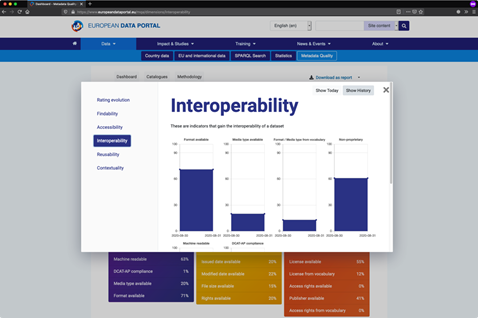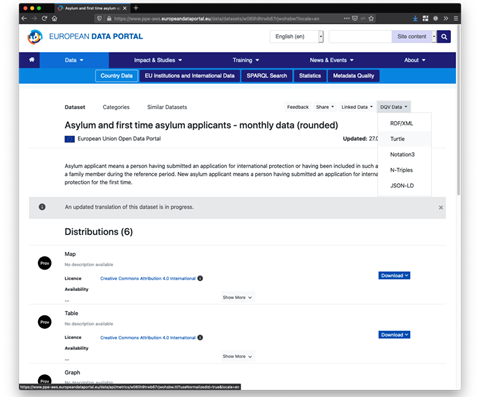The European Data Portal celebrates its 5th anniversary
The European Data Portal is celebrating 5 years of increasing the impact of open data across Europe
Join us in celebrating five years of open data on the European Data Portal (EDP)! Thank you to the open data publishers, re-users, enthusiasts, and to all our viewers and subscribers for following us on social media and exploring our news pieces, articles, events, blogs, webinars and reports. We invite you to continue sharing your valuable experiences, insights, and opinions with us going forward.
Evolution of the EDP
Five years ago, the EDP beta version was launched. The beta version started with 240,000 datasets and the accompanying metadata translated into 3 languages. As of November 2020, the EDP attracts on average 45,000 visitors a month from across the world and contains over one million datasets from 81 catalogues in 36 countries. The metadata is translated to all official EU languages, enabling multilingual keyword search and ease of access for users.
In addition, the portal offers 16 e-Learning modules in six languages that covers open data basics such as licensing or data formats and guidance on how to harness the value of open data. Moreover, EDP‘s collection of use cases has grown to offer over 700 examples on how open data is re-used in practice. In our collection, we showcase inspiring open data applications in different sectors, such as health, the environment, agriculture, regions and cities, and population and society.
Furthermore, the EDP supports you with:
- An active social media presence with almost 13,000 followers on twitter (@EU_Dataportal);
- An open data news feed that promotes national and local initiatives and updates on what institutions are doing around open data;
- An open data events page showing open data events around the world;
- Fortnightly Data Talks in collaboration with the Support Centre for Data Sharing (SCDS);
- A Country Insights page to showcase news, events, use cases, datasets and blog posts at a national level;
- Multiple reports on the effect of open data publication and re-use, such as the Economic Impact of Open Data Report;
- 18 analytical reports about hot topics in open data; and
- The annual survey of the Member States’ Open Data Maturity, its dashboard and report.
EDP version 3.1
Following the EDP’s version 3 launch on 6 March 2020, the EDP Consortium released version 3.1 of the website on 31 August 2020. The new and updated features include:
- Filtering datasets by quality – Users can use the Metadata Quality Assurance (MQA) score of datasets to filter when they search for data. A new scoring facet in the search results page streamlines and speeds-up searching through large sets of results.
- The Metadata Quality Assurance (MQA)’s performance “history” – The MQA now stores the catalogues’ performance over time and makes it available under the “Show History” button in each of the quality dimension cards. This is useful to benchmark performance and identify issues that may have affected a catalogue.
Slika

- MQA assessments are now also published using the Data Quality Vocabulary (DQV) standard – A new button was introduced on the dataset details page offering a download of the DQV file. In 2021 this information will be also made available interactively.
Slika

- Better MQA documentation – The usability of the MQA is improved by adding a better explanation of the indicators.
- Support to DCAT-AP 2.0 – Under the bonnet, the EDP is now prepared to support the new DCAT-AP 2.0 standard.
Future of EDP
The EDP is still growing, and the Consortium is constantly collaborating with national governments and open data portals to continue harvesting data and researching topics around open data, for example on COVID-19 and health data, environmental data and geodata.
Furthermore, we continue to share knowledge and experiences on open data re-use through news pieces, articles, webinars (Data Talks), reports, and at events. For example, our analytical report on Characterising Dataset Search on the European Data Portal published at the end of October 2020, and the Data Talk session this afternoon (Wednesday 25 November) titled “Microsoft – Closing the data divide” with Jeremy Rollison, a Senior Director for EU Government Affairs at Microsoft, to discuss the technology giant’s open data initiatives.
To continue improving, we invite you to keep sharing your experiences, thoughts, and opinions on open data with the EDP via mail, Twitter, Facebook or LinkedIn. Once again, thank you for your support and let’s continue to harness the potential of open data!
